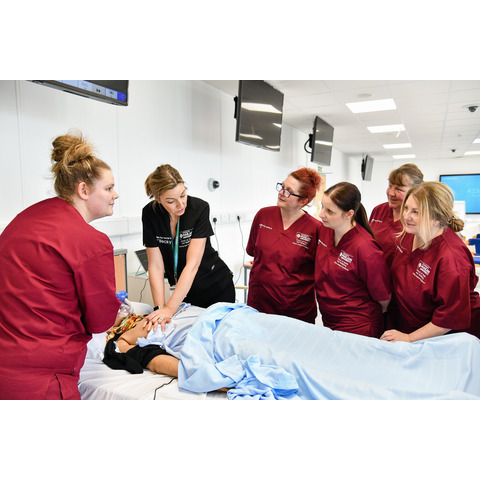University addresses shortage of learning disability nurses in England with revolutionary new programme
Released: 26.06.23

Plymouth Marjon University has today (26 June 2023) launched a ground-breaking initiative aimed at training learning disability nurses and combating the decline in the number of registered professionals in this crucial field. The new ‘Aspire’ programme is the first of its kind in England and has welcomed 15 students, ten from Devon and five from Cornwall, as part of its first cohort. 17 further students will join later in the year.
Since 2009, England has experienced a 42% decrease in registered learning disability nurses, from 5,553 to 3,214 in 2021. This new programme from Plymouth Marjon University is designed to tackle this issue and meet the growing demand for qualified professionals across the country.
Susan Masters, NHS Devon’s Deputy Chief Nurse said: “Nurses who are specialised in learning disabilities care provide such an important service for their patients, supporting with everything from preparing for surgery, to helping to manage long-term conditions such as diabetes. Through this programme, we will now be able to develop local, homegrown talent who will be able to use this qualification to benefit patients and their families in the South West.”
The Marjon ‘Aspire’ programme is delivered in two parts, beginning with the Postgraduate Certificate (PgCert) in Preparing for Practice. The first part of the programme takes seven months and students will undertake practical, classroom and online learning and will accumulate 750 clinical hours. The University is waiving the Postgraduate certificate fee for the students, demonstrating its commitment to supporting aspiring learning disability nurses.
Upon successful completion of part one, students will progress to the second part of the programme; a two-year MSc Pre-Registration Learning Disabilities Nursing programme with a focus on neurodiversity*. This segment will be delivered as an apprenticeship, with employers funding the course fee and ensuring students' continued salary. Graduates will be eligible to register as a Registered Nurse (Learning Disabilities) in November 2025, and will hold a MSc in Pre-registration Nursing (Learning Disabilities).
Professor Claire Taylor, Vice-Chancellor at Plymouth Marjon University commented:
"Marjon is committed to supporting individuals and communities across our region where there are gaps in provision, and our new Aspire programme represents a significant contribution towards addressing the shortage of learning disability nurses in England. Through comprehensive training, invaluable hands-on experience, and unwavering support, we aim to empower our students with the skills and knowledge to make a profound impact on the lives of individuals with learning disabilities and neurodiversity. Together, we can bridge the gap and meet the growing demand for qualified professionals, nurturing local talent to benefit patients and their families in the South West and beyond."
Marjon has involved key stakeholders in the design and production of the Aspire programme, including specialist staff from across NHS organisations in Devon and Cornwall. The way the programme is structured and funded is unique; it enables students to trial learning disabilities nursing before committing to the full degree. It is hoped this will help encourage more nurses into this specialist area of care.
Plymouth Marjon University's Aspire programme is a significant step forward in addressing the shortage of learning disability nurses in England. By providing comprehensive training, valuable hands-on experience, and ongoing support, the programme aims to equip students with the necessary skills and knowledge to make a meaningful difference in the lives of individuals with learning disabilities and neurodiversity.
Learn more about Marjon Aspire here, and other health programmes available at the University here.
*Subject to approval from the Nursing and Midwifery Council.


